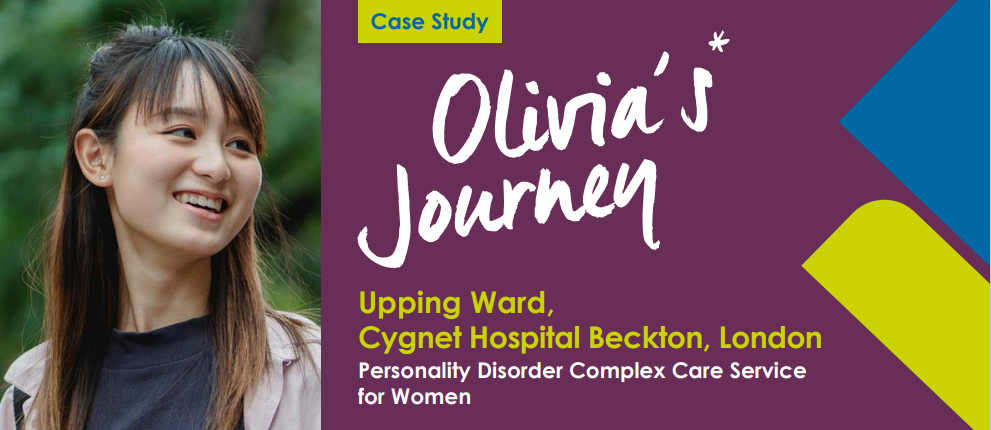
Olivia’s history
Born into a close family, Olivia’s childhood progressed happily until she encountered the chaos of primary school, becoming highly agitated with frequent meltdowns and interpersonal conflict. Although she did well with classroom support, matters escalated once she hit adolescence.
Periods of elation and hyperactivity alternated with periods of severe depression, paranoia and obsessive compulsivity. Olivia’s intellect and learning skills weren’t in doubt, but she struggled socially.
Olivia struggled to form friendships and was bullied. By her mid-teens, minor self-harm had evolved into major overdoses, as well as significant aggression toward her family resulting in multiple in-patient admissions, including in psychiatric intensive care (PICU) and secure services, and a diagnostic formulation of personality disorder, Obsessive-Compulsive Disorder (OCD) and mood disorder.
Olivia remained with her family through a tumultuous period until age 19, when she was placed in supported accommodation. This quickly broke down though, leading to five unbroken years of psychiatric hospitalisation. The early part of this was characterised by extreme violence, significant Deliberate Self-Harm (DSH), ultra-rapidly cycling mood and frequent episodes of seclusion. Although latterly she formed two friendships and family relationships improved, significant risk remained and attempts to implement a leave regime resulted in renewed episodes of absconscion and DSH. The placement no longer felt viable.
When Olivia came to us
Aged 22, Olivia was in a service some 250 miles from home, chosen primarily due to the proximity of a low secure ward with seclusion facilities, and being the only service that would accept her level of risk. The commissioning team recall the meeting where this move had been agreed and had never seen so many professionals and agencies holding such anxiety, all insisting Olivia could not be managed anywhere other than in a PICU. Two years on, Olivia was no longer in the hopeless place she had been when admitted, but regular, high risk incidents continued and her parents worried that she would need to be in hospital forever.
Although a move back to area appeared to offer the possibility of a new start, and she certainly wanted to return home, even the usually optimistic commissioner questioned the wisdom of another rehabilitation placement, envisaging instead a pathway ending in a care home with significant additional staffing.
Upping Ward assessed Olivia. The team were initially unsure whether they would be able to support her but following a second review and with some misgivings, offered her a placement, which the commissioners accepted with equal apprehension. Olivia and her family were also worried – in the weeks before the move incidents increased, additional 1-to-1 care was implemented and the move was postponed several times before transfer. Her family felt dread at the prospect of Olivia’s violence and turmoil once again at their door.
“I feel for young patients referred into adult services from long spells, sometimes years of inpatient treatment in CAMHs. Often there’s diagnostic confusion, usually significant behavioural challenge, and inevitably a long history of placement breakdowns and repeated rejection from services.”Dr. Christina Kyriakidou, Clinical Director, Complex Care Programme, South London Partnership
Olivia’s care
From the moment she arrived, the Upping Ward team put considerable effort into engaging with Olivia on her terms. She had specific concerns and strong preferences about her medication regime and aspects of her diagnosis, giving the service a chance to let her know her voice was heard and experience validated; and she appeared to have significant neuro-diverse traits that needed formal assessment and accommodation. Rapport grew quickly and within a fortnight of admission the additional 1-to-1 care Olivia had required for years was ceased.
The team recall that Olivia was “always in your face, asking for things” and “wouldn’t let go until she was satisfied”, for example needing ward round decisions typed up, printed and handed to her straight away. The ambiguity of things happening ‘later’ was intolerable to her. These demands felt easier for staff to understand seen through the lens of Autism Spectrum Disorder (ASD) rather than Personality Disorder. It became clear the staff team would be better equipped to work with Olivia if a programme of ASD training for the whole service was commissioned. The psychology team led this with the support of Cygnet Hospital Beckton’s senior Expert by Experience. They also worked closely with Olivia herself, delivering sessions tailored to ensure they were accessible, helping her better understand her diagnosis and learn coping and interpersonal skills.
With raised ASD awareness and a detailed OT sensory assessment/sensory safety plan, the team realised the extent to which noise was a trigger for sensory overload in Olivia. Understanding an absconscion early in her admission in this context allowed the team to be more sensitive to her needs, rather than simply restricting her freedom due to a poorly understood risk. It also allowed them to engage with Olivia’s family, whose home she had absconded to. This wasn’t always easy, particularly when the team decided to rescind Olivia’s MHA detention, which initially the family felt was a terrible idea. But with considerable efforts to reach compromise between what Olivia wanted and what her parents thought best, we helped them to trust us more and also to trust Olivia. They attended ward rounds and CPA meetings regularly, and over time they came to understand the benefits of positive risk-taking and reduced restrictive practice, let go their fears and cautiously embraced the enabling environment the team sought to create and the treatment plan agreed with Olivia.
The open culture of regular clinical meetings, where family and Olivia herself were treated as equal partners, had a profound effect on the family dynamics. Olivia started to have brief periods of home leave, with escorts for these trips gradually withdrawn. Within four months of admission she enjoyed unescorted day leave, then overnight stays with her family.
At the same time, the diagnostic complexity that had surrounded Olivia for years was unravelled. It was determined that she had bi-polar affective disorder, Attention Deficit Hyperactivity Disorder (ADHD) and Complex Post-Traumatic Stress Disorder (c-PTSD). The Complex PTSD itself needed understanding in the context of her traumatic social relationships arising from her now formally diagnosed ASD.
Olivia today
Olivia is now channelling her ADHD well. Physical health is important to Olivia and in the latter period of her 12-month admission to Upping Ward she became very involved in a local sport charity. She became a constant positive influence on her peers. Olivia co-facilitated community meetings, and showed her peers they could do so too. She supported peers when in distress. One said, “You don’t want to be Olivia’s friend if you’re not willing to engage in your recovery”.
After a tumultuous and often traumatic journey over the last decade, Olivia looks after her own medication needs, has been discharged from Mental Health Act (MHA) detention, and is now discharged from Upping Ward to supported living. Olivia viewed multiple options and exercised her choice where she wanted to live close to family, allowing her to create a secure support network.
Olivia has learnt how to exercise leadership (she took on a paid role in a tiered vocational pathway, chairing community meetings), and on a good day slows down to a pace others can enjoy.
According to her parents at her final Care Programme Approach (CPA) meeting, “This is the best place our child has been in.” Olivia’s leaving card included several messages from staff and peers at the sports charity, testifying to the progress she has made.
“I cannot tell you what a pleasure it has been to have you in the Sport for Confidence sessions. Your enthusiasm, consistency and openness to try different activities is so impressive. You have been an incredible team player, playing your part and encouraging others to do the same by your example. You will be very missed by us all. Thank you for being your amazing self!”Sports 4 Confidence
*Name has been changed to protect their identity




